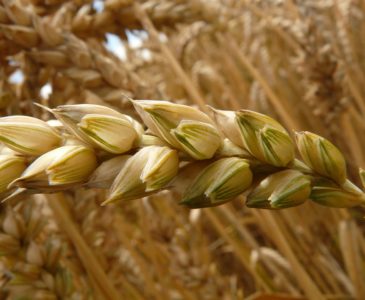Recently, we have been hearing a lot about gluten-related disorders. More and more people in my circle of friends and family have some sort of gluten intolerance. In fact 5% of population has some sort of gluten-related health problem. We see a lot of gluten free products appearing on the shelves of our supermarkets. Is it better to follow the trend and be on a gluten free diet? So what is gluten intolerance and celiac disease? And is there any correlation between gluten sensitivity and gut microbiota? And if there is what comes first?
Celiac disease (CD) is an inherited autoimmune disorder that affects the digestive process of the small intestine. Gluten, a protein found in wheat, rye, barley and sometime oats, can severely damage the intestinal lining. One third of all people have a gene that predisposes them to have celiac disease. Having celiac disease dramatically increases ones risk to develop type 1 diabetes.
Non-celiac gluten sensitivity, which is often referred to as gluten intolerance, causes the body to create a stress response located in the gut with the symptoms similar to celiac disease. However in this case the intestinal tissues is not affected.
Wheat allergy is different gluten issue which in some cases can be life threatening because the immune system in the body considers it very dangerous (when it is not). The allergic reaction symptoms are very different from the ones of celiac disease and gluten intolerance, such as itchy eyes and hard time breathing.
There is a lot of new research focused on the role of dietary gluten on the 100 trillion bacteria leaving within us. One of the recent studies showed that germ-free mice (no microbes in the gut) and conventional mice (they had a very complex microbiota similar to human microbiota) developed immunological responses on a gluten containing diet unlike specific-pathogen-free mice (these were colonized with only 8 bacterial strains that were not opportunistic pathogens and did not belong to a common Proteobacteria group). All these mice had genetic predisposition to develop celiac disease however only those that were lacking specific microbes in their gut did not develop the disease. This striking result suggests that the presence or absence of certain bacterial strains in your gut can reduce or enhance celiac disease symptoms.
The most recent study by the same group from McMaster University in Canada showed that opportunistic pathogen Pseudomonas aeruginosa increase the immunogenicity of gluten peptides by modifying them using elastase activity in the small intestine which may result in CD. However if there are enough Lactobacillus spp. strains in the small intestine they can detoxify these modified peptides and prevent the disease.
Another interesting study isolated 144 strains belonging to 35 bacterial species from human fecal samples and tested if they could metabolize gluten. 94 strains were able to metabolize gluten and 61 strains were capable to secrete specific enzyme to break down gluten protein. And several strains were capable to metabolize immunogenic peptide found in celiac patients. Most of the strains belonged to Lactobacillus, Streptococcus, Staphylococcus, Clostridium and Bifidobacterium genera.
One may argue that the previous study used humanized mice. Would it be relevant for humans? Let’s see what science has on studies with humans.
A number of studies have been reporting the differences in the microbiota composition in healthy individuals vs. celiac disease patients. This recent study showed dicrease of Lactobacilli and increase of Clostrida in the patients with CD.
Six weeks on Bifidobacterium infantis NLS Super Strain were shown to reduce symptoms and α-Defensin-5, a marker for the innate immunity characteristic to celiac disease – a good thing.
Bifidobacterium breve BR03 and B. breve B632 decrease production of pro-inflammatory cytokine TNF- α in children with CD on gluten free diet – also a good thing.
The following bacterial strains have been shown the potential to help improve the health status of CD patients in vivo and in vitro:
Bifidobacterium longum CECT 7347
Lactobacillus ruminis, Lactobacillus johnsonii, Lactobacillus amylovorus, Lactobacillus salivarius
Lactobacillus paracasei CBA L74
Now we know that there are environmental factors that may contribute to the onset of the CD and there are potential treatments in addition to gluten free diet. But how can we prevent it? This question remains open. Couple of recent very large and well controlled studies showed that delayed introduction of gluten containing cereals or early introduction of small amounts at 4 months of age did not have significant difference on the risk of the disease when comparing the intervention with the placebo group. Moreover breastfeeding duration did not have any effect on the risk of developing celiac disease.
One thing is clear that gluten is the number one environmental trigger and microbiota has an extremely important role in it. It is also clear that the lack of good bacteria or low numbers of good bacteria in your gut may be an important contributor to the intestinal symptoms. The good thing is that there are number of ways to enrich you gut microbiota via live probiotic bacteria and prebiotics found in fermented foods and numerous fruit and vegetables.
You might also like to read the articles about:
- PROBIOTICS VS ANTIBIOTICS
- TIPS FOR CHOOSING THE RIGHT PROBIOTIC
- BREAST-FEEDING THE MICROBIOME
- CAN PROBIOTICS HELP WITH ANTIBIOTIC ASSOCIATED DIARRHEA?
- FIVE THINGS YOU NEED TO KNOW ABOUT TRICLOSAN AND OUR MICROBIOME


Love your blog..
My mom died from an autoimmune illness called scleroderma 2 months ago…it was terrible watching her suffer..probiotics really helped in her last days….the info you have here is great. Thanks
Dear Sunshinesoulsuster,
Thank you so much for leaving your comment. I am so sorry to hear about your mom. But I am really glad you saw positive changes with probiotics.
Karina